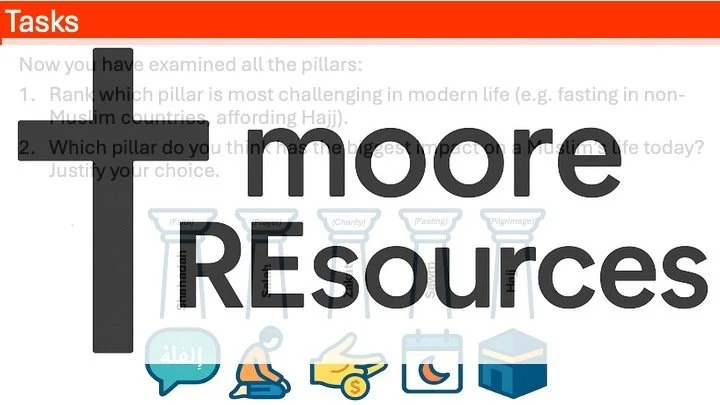 Image 1 of 16
Image 1 of 16

 Image 2 of 16
Image 2 of 16

 Image 3 of 16
Image 3 of 16

 Image 4 of 16
Image 4 of 16

 Image 5 of 16
Image 5 of 16

 Image 6 of 16
Image 6 of 16

 Image 7 of 16
Image 7 of 16

 Image 8 of 16
Image 8 of 16

 Image 9 of 16
Image 9 of 16

 Image 10 of 16
Image 10 of 16

 Image 11 of 16
Image 11 of 16

 Image 12 of 16
Image 12 of 16

 Image 13 of 16
Image 13 of 16

 Image 14 of 16
Image 14 of 16

 Image 15 of 16
Image 15 of 16

 Image 16 of 16
Image 16 of 16

















Unit 1 - Islam Bundle
Bring the depth and beauty of Islamic belief, identity, and moral teaching to life with this comprehensive and inspiring Bundle Pack for Units 1.5 to 1.7: Islam. Carefully aligned to the WJEC Religious Studies 2025 specification, this fully resourced collection enables learners to explore key Islamic doctrines, beliefs about life and death, moral frameworks, and visible expressions of faith in everyday life. Thoughtfully designed to promote clarity, encourage respectful understanding, and support exam preparation.
Learners Will Understand:
1.5.1c Key Beliefs and Teachings in Islam
Core beliefs about the nature of Allah, including His oneness, compassion, justice, and power.
The importance of tawhid and why images of Allah are avoided in Islamic tradition.
The role of prophets such as Adam, Ibrahim, Isa, and the final prophet, Muhammad.
Beliefs about the soul: its divine origin, purpose, and link to human responsibility.
Submission to Allah as the essence of being Muslim, expressed through the Shahadah and other core practices.
The significance of sacred texts and their role in daily life and worship.
1.5.2c Islamic Belief in Action
The role of the Muslim community (Ummah) in fostering unity and shared purpose.
The expectation to live out faith through acts of compassion, mercy, and social justice.
Charity, generosity, and support for the vulnerable as central to Islamic life.
Real-life examples of Islamic faith in action, with a focus on charitable organisations such as Islamic Relief.
1.6.1c Meaning of Life in Islam
Living a life of submission to God’s will, through worship, ethical action, and service to others.
Preparing for accountability in the next life by living with purpose and intention.
1.6.2c Islamic Beliefs About Life and Death
Belief in life after death, including the soul’s journey, judgement, and the concepts of reward and punishment.
The role of predestination and divine justice in shaping Islamic understandings of the afterlife.
1.6.3c Islamic Mourning and Funeral Practices
The spiritual and communal significance of Islamic funeral rites.
Practices such as washing, shrouding, and burying the deceased, with simplicity and dignity.
Mourning customs, including prayer, remembrance, charity, and community support.
1.7.1c Islamic Identity, Belonging and Practices
The importance of community, worship, and shared direction in life.
Pilgrimage (Hajj) as a unifying act of devotion, with key sites including Mount Arafat and Mina.
Identity expressed through visible practices such as dress and dietary observance.
1.7.2c Islam and Morality
Islamic moral decision-making based on divine command, prophetic example, and ethical reasoning.
The role of conscience, community, and religious guidance in navigating moral challenges.
Belief in judgement after death and the eternal significance of moral choices.
Suitable for:
WJEC GCSE Religious Studies (from 2025)
KS4 general RE modules
Ethics, philosophy, and citizenship crossover sessions
Revision, enrichment, or foundation courses
Bring the depth and beauty of Islamic belief, identity, and moral teaching to life with this comprehensive and inspiring Bundle Pack for Units 1.5 to 1.7: Islam. Carefully aligned to the WJEC Religious Studies 2025 specification, this fully resourced collection enables learners to explore key Islamic doctrines, beliefs about life and death, moral frameworks, and visible expressions of faith in everyday life. Thoughtfully designed to promote clarity, encourage respectful understanding, and support exam preparation.
Learners Will Understand:
1.5.1c Key Beliefs and Teachings in Islam
Core beliefs about the nature of Allah, including His oneness, compassion, justice, and power.
The importance of tawhid and why images of Allah are avoided in Islamic tradition.
The role of prophets such as Adam, Ibrahim, Isa, and the final prophet, Muhammad.
Beliefs about the soul: its divine origin, purpose, and link to human responsibility.
Submission to Allah as the essence of being Muslim, expressed through the Shahadah and other core practices.
The significance of sacred texts and their role in daily life and worship.
1.5.2c Islamic Belief in Action
The role of the Muslim community (Ummah) in fostering unity and shared purpose.
The expectation to live out faith through acts of compassion, mercy, and social justice.
Charity, generosity, and support for the vulnerable as central to Islamic life.
Real-life examples of Islamic faith in action, with a focus on charitable organisations such as Islamic Relief.
1.6.1c Meaning of Life in Islam
Living a life of submission to God’s will, through worship, ethical action, and service to others.
Preparing for accountability in the next life by living with purpose and intention.
1.6.2c Islamic Beliefs About Life and Death
Belief in life after death, including the soul’s journey, judgement, and the concepts of reward and punishment.
The role of predestination and divine justice in shaping Islamic understandings of the afterlife.
1.6.3c Islamic Mourning and Funeral Practices
The spiritual and communal significance of Islamic funeral rites.
Practices such as washing, shrouding, and burying the deceased, with simplicity and dignity.
Mourning customs, including prayer, remembrance, charity, and community support.
1.7.1c Islamic Identity, Belonging and Practices
The importance of community, worship, and shared direction in life.
Pilgrimage (Hajj) as a unifying act of devotion, with key sites including Mount Arafat and Mina.
Identity expressed through visible practices such as dress and dietary observance.
1.7.2c Islam and Morality
Islamic moral decision-making based on divine command, prophetic example, and ethical reasoning.
The role of conscience, community, and religious guidance in navigating moral challenges.
Belief in judgement after death and the eternal significance of moral choices.
Suitable for:
WJEC GCSE Religious Studies (from 2025)
KS4 general RE modules
Ethics, philosophy, and citizenship crossover sessions
Revision, enrichment, or foundation courses































